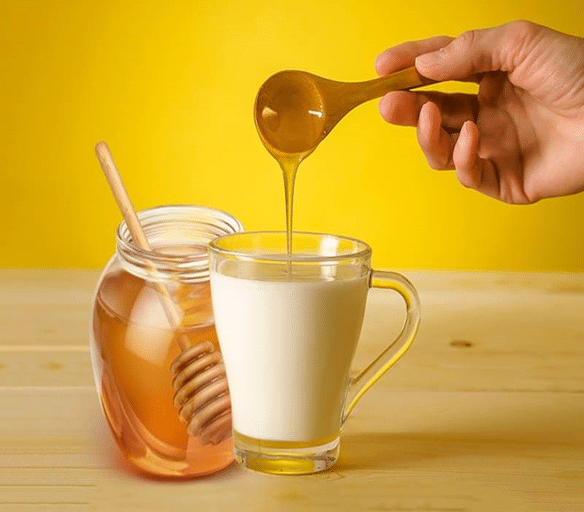Milk and honey have amazing health benefits. When combined, they may provide many surprising health benefits. This includes benefits in skincare and increased stamina.
Honey is rich in antioxidant, antibacterial, and anti-fungal properties and has soothing, anti-inflammatory effects on respiratory issues. Milk has vitamin and mineral content like fat-soluble vitamins – vitamin A, D, and B vitamins, and calcium. It may also contain animal protein and lactic acid. When you combine milk and honey, they give you some unique and desirable benefits.
Honey with a cup of warm milk is not just delicious but healthy. Here are a few of the top reasons you should try this drink:
Skin Care
Both honey and milk may possess antimicrobial and cleansing properties. According to an article published in the Central Asian Journal of Global Health, honey kills microbes that affect the skin, amend immunological parameters, may reverse resistance to antibiotics, might inhibit tumour cell growth, may promote tissue repair, and might protect against UV damage.
When mixed with milk, honey masks might be effective for relieving acne. The facemask brings together the properties of both ingredients. The two are common ingredients in natural cleansers because when used together they can give the skin a healthy glow.
Might help Bone Health
As research on honey continues, it is gradually becoming clear that honey may act as a carrier and transporter of nutrients from food throughout the body. Specifically, honey may improve the body’s acute uptake of calcium, of which milk is a rich source.
Consuming honey and milk together will not only give your body the calcium for your bones, but it will also maximize its absorption in the body. Proper calcium levels can prevent conditions like osteoporosis and inflammation of the joints.
Might Reduce Insomnia
Honey and milk are remedies for insomnia and sleeplessness in alternative medicine. Honey contains tryptophan, which might help in promoting good sleep. Tryptophan converts into serotonin, which induces a feeling of relaxation.
Individually, they both can be effective, but more effective when taken together. In a 2018 research, published in Clinical Nutrition, the researchers observed that heart patients who were administered a milk and honey mixture twice a day for three days reported a may have marked improvement in their sleep.
May have Antibacterial Properties
Honey and milk may have potent antibacterial properties. However, together they can enhance each other’s antibacterial power. A review published in the African Journal of Biotechnology found that the combination of milk and honey could provide not just nutrition, but might also act as effective protection against microbial infection.
The drink may be effective in managing flatulence, constipation, and intestinal disorders. It can also be good for treating respiratory disorders such as cold
Anti-aging Properties
While we may not have studies on milk and honey combined, research has shown quite conclusively that individually both may have powerful antioxidant and anti-inflammatory properties that might make them effective anti-aging agents.
A study published in the Iran Journal of Basic Medical Science further found that antioxidants in honey might slow down cognitive decline. Similarly, the antioxidant carotenoid and vitamin D have milk’s anti-aging properties in an article published in Dermato Endocrinology.
Does Honey Become Toxic In Warm Milk?
Honey does not become toxic when added to warm milk. However, don’t heat honey to temperatures higher than 140 degrees. Heating honey rapidly over direct heat results in the degradation of its nutrient value. It can also result in the formation of a compound known as 5-Hydroxymethylfurfural, which can have both beneficial and harmful effects on our health. However, it does not turn toxic.
It is better to add the desired amount of honey in warm milk, rather than heating it with the milk or adding it to hot milk.
PLEASE NOTE: While honey and milk can benefit your health in many ways,
- Do not drink milk and honey if you are lactose-intolerant or allergic to honey.
- Increased acne comes from high consumption of dairy. So, avoid this drink if you are susceptible or if you experience a sudden acne breakout.
- Remember, moderation is the vital!


